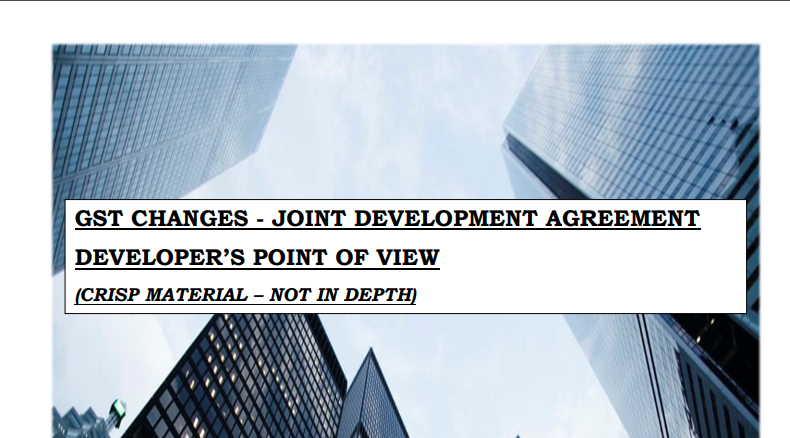GST Changes – Joint Development Agreement
GST Changes – Joint Development Agreement Developer’s Point of View
Basic Details
1) a) There has been a complete change in the GST taxability for the real estate sector w.e.f 1st April 2019. Therefore, all related provisions i.e. the rate of GST, a person liable to pay GST, the timing of GST payment, related exemption, etc. are different up till 31st March 2019 and from 1st April 2019.
1) b) In this document we shall go through the changes on taxability for joint development agreement before and after 1st April 2019.
1) c) This document discusses compliances only from the Developer’s point of view & not the landowner’s.
JDA & Its Taxability Under GST
Joint Development Agreement:
An arrangement whereby a landowner contributes his land for the construction of a real estate project and the developer undertakes the responsibility for the development of the property, obtaining approvals, performing legal formalities, and marketing the project. The landowner enters into an agreement and gives a General Power of Attorney to the developer, assigning him a duty to obtain the mandatory approvals from various authorities and allows the developer to enter the land and do all necessary things for undertaking the construction.
Types of Joint Development Agreement:
1. Area Sharing Agreement
- Pure Residential Project
- Pure Commercial Projects
- Residential cum Commercial Projects
2. Revenue Sharing
3. Combination of Area & Revenue Sharing
Related Topic:
Taxability of Joint Development Agreement
2) A) Taxability of JDA under GST:
Taxable Limbs or Taxable Events in such arrangements are as follows: (Refer Note below)
- Revenue Sharing or Area Sharing – Transfer of development right from the landowner to the developer.
- Area Sharing – Provision of construction services by the developer to the landowner in lieu of development rights given.
Note: Above taxable events are restricted to the possibility of tax liability arising due to the JDA arrangement.
Related Topic:
Madras HC in the case of Tvl. Transtonnelstroy Afcons Joint venture
2)A) i) Transfer of Development Right from Landowner to Developer:
Projects as recognized by GST Law (same as RERA):
REP: Any project other than an RREP is a “Real Estate Project”.
RREP: A “Residential Real Estate Project” means a „Real Estate Project” in which the carpet area of the commercial apartments is not more than 15 percent. of the total carpet area of all the apartments in the project.
Related Topic:
Profit sharing based agreement with tenant will also fall in renting
I. Position Up To 31st March 2019:
a) Type of agreement: Revenue or Area or Both
b) Type of Construction: Residential or Commercial
c) Rate of GST: 18 percent. (Supply of “service” being development right supplied or given to developer SAC 9972).
d) Payable by: Landowner on Forward charge. (NN 11/2017- Other real estate services)
e) Timing of Liability:
i. Monetary Consideration (Revenue Sharing):
As per Section 13 (GST payable in the month of issue of Invoice if invoice issued within 30 days of receipt of payment otherwise month of receipt of payment, basically immediately on receipt of payment from the developer)
ii. Non-monetary consideration (Area Sharing):
Up to 24th Jan 2018: As per Section 13.
From 25th Jan 2018 to 31st March 2019: GST was payable when there is the transfer of possession or rights in the constructed area by entering into conveyance deed or similar document e.g. issue of allotment letter. (NN 4/2018)
f) Value of Supply: As per Rule 27 of the CGST Rules (Open Market Value, Similar Apartment – of like kind, quality value, etc.) (with 1/3rd land deduction)
Read & Download the full copy in pdf:
 CA Karishma Chawla
CA Karishma Chawla
An Associate Chartered Accountant from Mumbai, Maharashtra, a practising member of the ICAI cleared in 2016. She has experience in Audit and Taxation, both direct and indirect,and is practising in all those fields however, specialises in IndirectTaxation, GST. She is associated with another CA firm and is leading their GST practice with their team. Apart from guiding for GST compliances and GST Audit, she is also assisting in GST assessments, finalising accounting adhering GST related adjustments, scrutinies and providing guidance for other general business organization and development activities. She has keen interest in GST Litigation and looks forward to keep learning and growing from others constantly trying to improve her skills.









